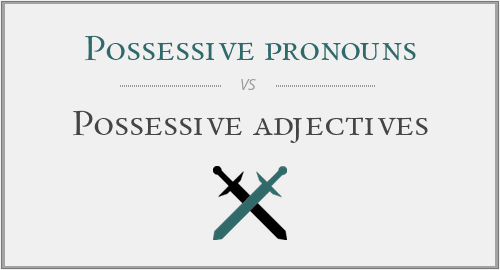Possessive
The word possessive itself is an adjective, which means expressing possession or ownership of something.
Possessive pronouns
Based on the definition above, we use possessive pronouns to tell about something that one owns. For example –
This pencil is mine.
The pencil is yours now.
Possessive pronouns are a replacement of nouns. Consider the below example –
The book next to the window is Rohan’s.
Rohan is the noun here. Let us replace the noun with a pronoun –
The book next to the window is his.
His here is the possessive pronoun. Note that in the original sentence, the name was followed by an apostrophe, however, in the pronoun form, we do not use apostrophe. However, we add the ‘s’ when needed.
Some more examples of possessive pronouns –
· The painting that was shown in the end was ours.
· The ear-rings that our cook found were hers.
· The photo that is lying on the table is yours.
· The final decision to move out is theirs.
Note that all the above sentences are in passive voice. Rather than focussing on the subject, the sentences focus on the object.
Possessive adjectives
Possessive adjectives are used to describe nouns, not replace them. Possessive adjectives also show ownership. Consider the below example –
John broke John’s knee while playing football.
The second John here is redundant. So –
John broke his knee while playing football.

As we see, the word his here doesn’t actually replace the noun, but tells an additional information about the noun.
Some more examples –
· Maria and Meeta missed their train.
· We left our tickets at home.
· The cat moved its claws in a restless manner.
· She left her phone number and asked you to contact her.
· I miss my grandfather very much.
All the above sentences are conveying some information about the nouns. Hence, they are in active voice.
Do a quick check to see if you have got the knack of it –
1. I tore the pages of ___ book, but later realised that the book wasn’t _____. (my, mine)
2. I don’t think it is ___ car, if the car was ___, he wouldn’t have given you the keys so easily. (his, his)
3. We missed ____ train, and the fault was totally ____. (our, ours)
Possessive pronouns with gerunds
If you want to know what are gerunds, you can read a nice article about it here.
Gerunds are nouns with -ing. They can be used with possessive pronouns as follows –
· I can’t tolerate his crying anymore.
· Their understanding of the whole matter is impressive.
· I love listening to your singing.
· Her coming back home early to meet us was appreciable.
· Your going out with her everyday is not a good thing.
Hope this article gave you good insights about possessive pronouns and possessive adjectives.




Have a discussion about this article with the community:
Report Comment
We're doing our best to make sure our content is useful, accurate and safe.
If by any chance you spot an inappropriate comment while navigating through our website please use this form to let us know, and we'll take care of it shortly.
Attachment
You need to be logged in to favorite.
Log In